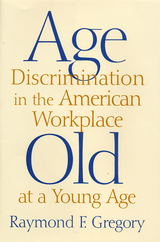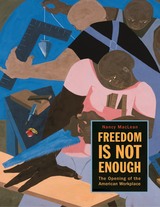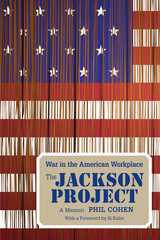
Nearly every middle-aged and older worker, at some time during his or her career, will suffer age discrimination in the workplace. Employers too often use early-retirement plans, restructurings, and downsizings to dismiss older workers. Many of these individuals are unwillingly ushered into earlier-than-planned retirements, are denied promotions, or are terminated. The baby-boomer generation now accounts for just under 50 percent of the entire workforce. A vast army of workers now stands ready to contest employer acts of age discrimination.
Attorney Raymond Gregory addresses himself to the millions of workers who think they might be facing age discrimination and traces the history of the federal measures enacted to assist workers in contesting unlawful employer conduct. He explains how the law works and presents actual court cases to demonstrate the ways that workers have challenged their employers. The cases help to illustrate legal principles in real-life experiences and many of the cases relate compelling stories of workers caught up in a web of employer discriminatory conduct. Gregory has eliminated all legal jargon, ensuring that all concepts are clear to his readers. Individuals will turn to this book again and again to obtain authoritative background on this important topic.

In the 1950s, the exclusion of women and of black and Latino men from higher-paying jobs was so universal as to seem normal to most Americans. Today, diversity in the workforce is a point of pride. How did such a transformation come about?
In this bold and groundbreaking work, Nancy MacLean shows how African-American and later Mexican-American civil rights activists and feminists concluded that freedom alone would not suffice: access to jobs at all levels is a requisite of full citizenship. Tracing the struggle to open the American workplace to all, MacLean chronicles the cultural and political advances that have irrevocably changed our nation over the past fifty years.
Freedom Is Not Enough reveals the fundamental role jobs play in the struggle for equality. We meet the grassroots activists—rank-and-file workers, community leaders, trade unionists, advocates, lawyers—and their allies in government who fight for fair treatment, as we also witness the conservative forces that assembled to resist their demands. Weaving a powerful and memorable narrative, MacLean demonstrates the life-altering impact of the Civil Rights Act and the movement for economic advancement that it fostered.
The struggle for jobs reached far beyond the workplace to transform American culture. MacLean enables us to understand why so many came to see good jobs for all as the measure of full citizenship in a vital democracy. Opening up the workplace, she shows, opened minds and hearts to the genuine inclusion of all Americans for the first time in our nation’s history.

In this riveting memoir, Cohen takes the reader from the union hall and factory gates to the bargaining table and courtroom, and ultimately to the picket line. We see him winning the trust of disillusioned union members, negotiating with a hostile employer and its high-powered legal counsel, and hitting the pavement with leaflets and union cards in hand. We get to know the millworkers with whom he formed close bonds, including a stormy romance with a young woman at the plant. His up-close account of the struggle brims with telling descriptions of the negotiating process, the grinding work at the textile mill, the lives of its employees outside the workplace, and the grim realities of union busting in America. When the organizer’s four-year-old daughter accompanies him to the field, a unique an unexpected dimension is added to the chronicle.
A compelling, dramatic story that alternated between major triumphs and frustrating setbacks, The Jackson Project provides a rare look at the labor movement in the American South from an insider’s perspective.
READERS
Browse our collection.
PUBLISHERS
See BiblioVault's publisher services.
STUDENT SERVICES
Files for college accessibility offices.
UChicago Accessibility Resources
home | accessibility | search | about | contact us
BiblioVault ® 2001 - 2024
The University of Chicago Press









